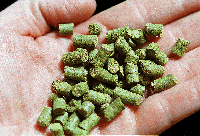Hops add characteristic tart tasteBarley malt adds to Amber Lager's color, flavor; corn pulls brew togetherPaula Reed WardStaff Writer From the Pottsville Republican
But most people don't know that the bitterness comes from hops, the color and flavor come from barley malt and what turns it into a liquid is the corn grits. Hops, a perennial vine, grows on suspended trellis-work up to 20-feet tall, and grows best in Washington State, Oregon and Idaho. Attempts were made a few years ago to grow the hops in New York State, but the climate would not support the crop, said N. Ray Norbert, brewmaster at D.G. Yuengling & Son. One batch, or about 145,800 12-ounce cans of Amber Lager, uses 72 pounds of hops grown in Yakima County, in south-central Washington State. The hops used in Yuengling's lager are grown by John I. Haas Inc. of Yakima, the 55,000-population county seat. The company, which farms 2,700 acres of its own and buys from another 40 growers, is the largest hop processor in the world, according to the director of North American sales, John J. Gorman. Hops are also grown in Australia and New Zealand and in several other countries, but 65-70 percent of those used in the United States are cultivated in Washington State. There are more than 140 varieties of hops -- Splat, Chinook, Fuggle, Hallertaur, Galana, Olympic and Perle being among the more exotic-sounding varieties. But the varieties are grown to the specifications of individual breweries, Gorman said: D.G. Yuengling & Son uses Clusters and Cascades for its Amber Lager. "They train the vines to grow clockwise" to get maximum sunlight, Gorman continued, with the first varieties ready to harvest Aug. 21 -- next Thurs-day. The vines produce pine-cone-like blossoms that are cut from the trellises and fall into a truck beneath. The flowers are separated from the vines by a machine called a hop picker, then dried in a kiln before being processed into compacted blossoms, pellets or an extract. Amber Lager -- as with all the other brews produced by "America's Oldest Brewery" -- uses the pellet form. Hops add bitterness and aroma, with different varieties producing different levels. "If you had beer without hops, it wouldn't hold very well, and it would taste sweet," Gorman said. Over the years, the "hoppiness" in beer has decreased, for several reasons, including consumer preference for a milder beer. "People wanted something a little more neutral," Norbert said. "Some people like a beer that's more hoppy, or bitter -- it's the hop aroma." Another important ingredient in Amber Lager is the barley malts. The two different types of malt used in Yuengling's Amber Lager are Carmeland Pale, and are about the same size as sunflower seed kernels. Most of the malt used in the United States is grown -- also to producers' specifications -- in the Dakotas, Wisconsin, Michigan and Canada. The color and flavor of Amber Lager comes from carmel malt, Norbert said. "It's a malt that is heated to a certain temperature to cause some of the sugars in the malt to carmelize," Norbert said. "That gives us that particular color and flavor." About 16,000 pounds of malt is used in one batch of lager. The carmel malt used in Amber Lager is purchased from a malting company in Chilton, Wis. To finish out the grains, about 4,300 pounds of corn grits from Illinois and Indiana are used, Norbert said. The grits are a similar consistency to corn meal and give the beer part of its liquid once it's mixed with the malt. Adding those materials up, it takes about 24,000 pounds of material to make 13,950 gallons of beer. "We go through an awful lot of material," Norbert said |
